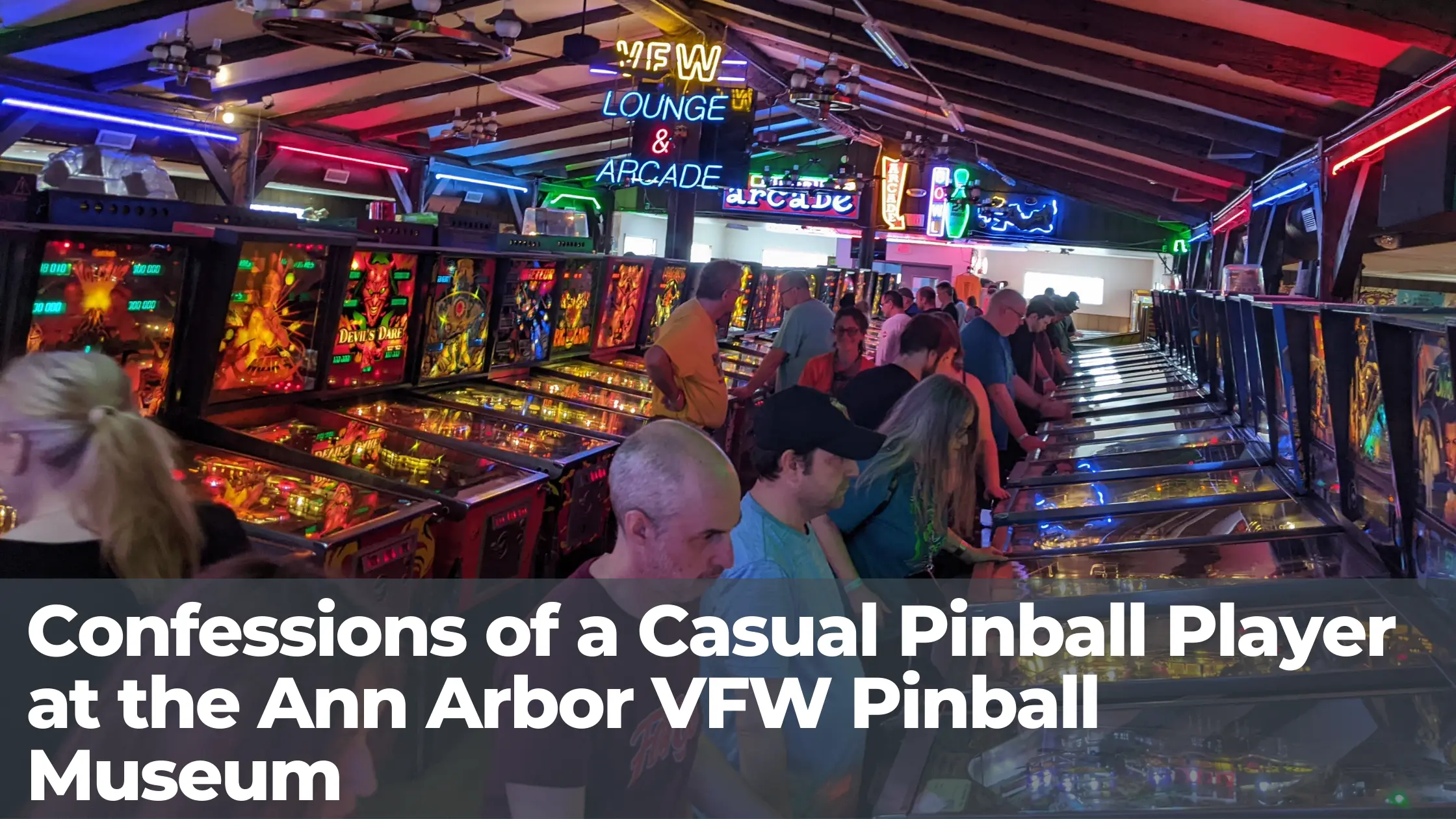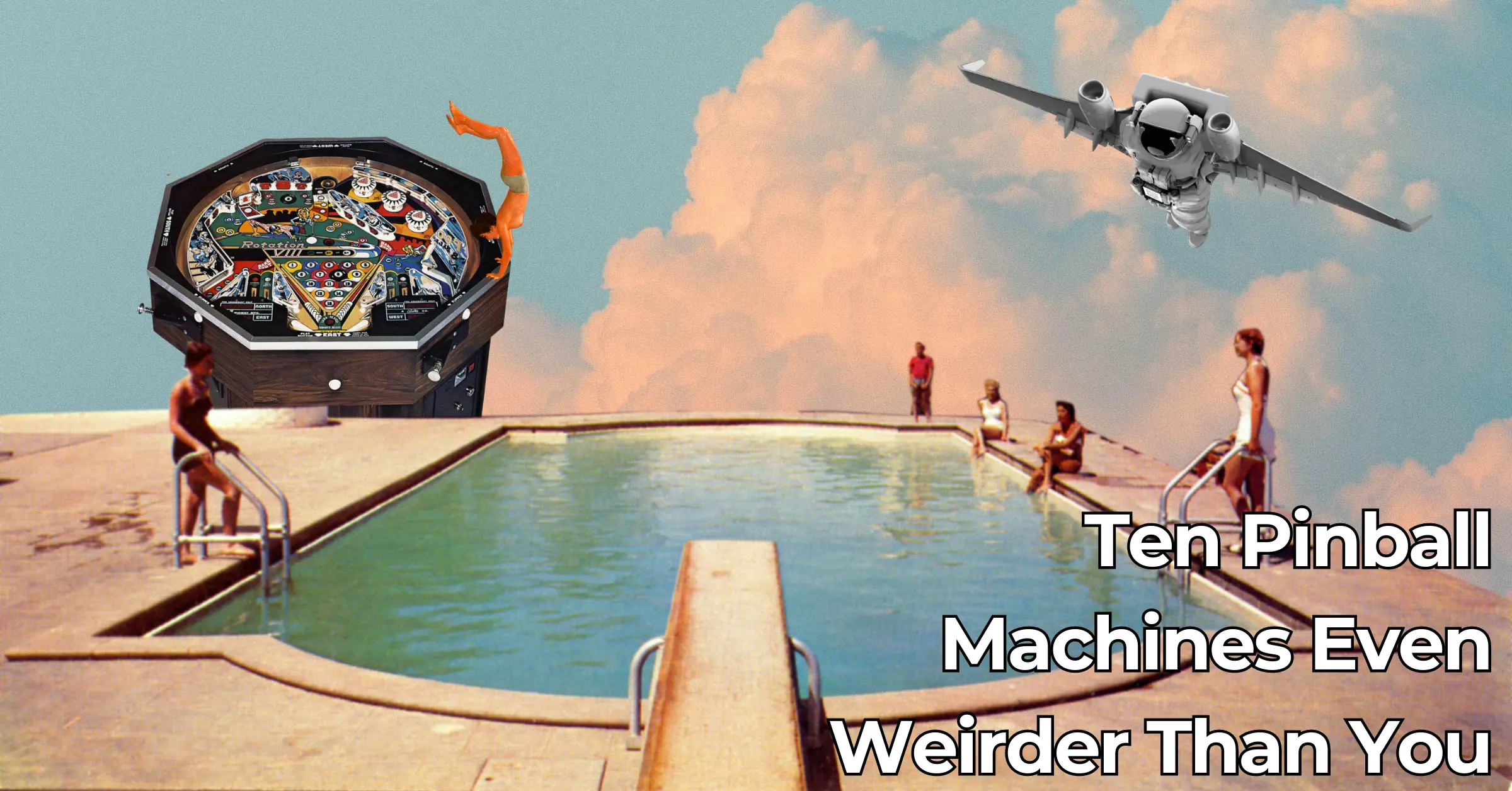Pinball Community Spotlight: Brian O'Neill of Scorbit

Image Gallery
Note - this piece originally appeared as part of a sponsored article series on the IFPA's website back in February of 2023. Republishing it here in October of 2023 without change. The original piece can be seen here.
Welcome to the first of (hopefully many) pinball community spotlights, where we interview the operators, tournament organizers, and business owners that make the pinball world go ‘round.
At Kineticist, we’re constantly inspired by these pillars of the pinball community. As part of our fancy new IFPA sponsorship, we thought it’d be fun to take some time to get to know them a little better.
We kick off this series with Brian O’Neill, co-founder and CTO of Scorbit. Scorbit is a lot of things, but mostly it helps pinball owners and operators connect their machines (from early solid state games to moderns) to the internet. You can log scores, connect with friends, complete challenges, and if you operate, get access to detailed analytics and performance reports.
Besides his work with Scorbit, Brian is a very accomplished competitive pinball player, currently ranked 57th in the world (at time of publishing). For those of you also into the competitive scene, Brian will be traveling to many of the top tournaments this year like IFPA18 in Germany and the North American Championship at District 82. He’s also a frequent tournament organizer in the New England area and growing location operator.
Interview with Brian O'Neill of Scorbit
Kineticist: Everyone’s got a pinball origin story - what’s yours?
Brian: So I’ve talked a lot about how Attack From Mars was the game that got me into the physical realm of pinball but not many people know that I was really into digital pinball before I ever got into physical pinball. I used to get a computer magazine in the mail every month and one issue talked about this game Crystal Caliburn. It was a medieval knight themed pinball game. It looked so cool that I saved up money so I could buy it. I played that game obsessively! I even got to the wizard mode once before I even knew the term “wizard mode”. That game kickstarted a love of all things pinball which led to me moving from digital to the analog world of pinball.

Kineticist: You launched Scorbit back in 2015, really before anyone was doing internet connected pinball. Can you tell us what that journey has been like building this company and maybe some things you’ve learned along the way?
Brian: There have been so many things I've learned, but not what I would have expected. It's a tale as old as time but finding out who your true friends are was one of the big lessons. Another one that people always say is "imitation is the sincerest form of flattery". Yes, I'm flattered there is a certain pinball company that implemented something very similar to what Scorbit had already created, but at the end of the day, I'd love to just work together instead of being competitors. The journey has been wild but I'm glad to have built what we envisioned so long ago. Sometimes when using Scorbit on an old game like Paragon, I think "Wow, we built this thing! It actually works!"
Kineticist: How has the launch and growth of Stern’s Insider Connected platform changed things for Scorbit? Is it expanding the market for you or making things more competitive?
Brian: It's great that Insider Connected built on what we started and is exposing even more people to the concept of connected pinball, but in all fairness, it's limited. Stern Insider Connected works on their 19 or so games whereas we work on over 400 titles including all of Stern's back catalog of SAM, Spike 1 and Whitestar games. The one frustrating thing is the fragmentation of different services it causes. Having a universal place to store your scores and achievements would be something beneficial for the community and something we want to see. That's why we've always had our API open and free for the community to use. Closed systems are never great for the community.
Kineticist: How have your playing, operating, and organizing experiences influenced the Scorbit product?
Brian: Personally, I find it hard to envision how other people use our product. We take in a lot of feedback from people like Neil McRae, Derek Correia and Karl DeAngelo. They have been so helpful in getting other perspectives so we can change and improve our product. We wouldn't be where we are today without the community helping to improve Scorbit. However, nothing beats thousands of players emailing and posting their views every day online and on our Discord!
Kineticist: What’s your favorite Scorbit feature, and why?
Brian: As a casual player, it's definitely the achievements that are currently integrated with Jersey Jack games. I can't wait to expand that product into more titles to give older games new life. As a tournament player and organizer, I love our integrations with Matchplay and Neverdrains (DTM). It makes entering scores fast and easy. Instead of waiting for the game to scroll through all the menus, I have the score immediately which saves so much time. As an operator, I love seeing the statistics on how much play my games are getting as well as the operation status of the games. I look forward to seeing more operator features in the future.
Kineticist: Anything interesting on the product roadmap for Scorbit in the next year that you can talk about?
Brian: I'm really looking forward to expanding our achievements to other titles in the next year. Additional operator features will also be a priority in 2023. We are always open for feedback for features our users want to see and have already built plenty of features based on previous feedback. The new auto-claim feature we just released came out of previous feedback from our passionate community.
Kineticist: Operating machines, organizing tournaments, building a pinball technology company - it’s a lot of work! Why do you do it?
Brian: When working with something you are passionate about, it doesn’t feel like actual work. I’m very lucky to have support from my family to continue to work on all these facets of the pinball world.

Kineticist: What are some things that happen behind the scenes that the average player or pinball fan might not appreciate?
Brian: Officiating tournaments and making the correct rulings is a really stressful and thankless job. There are always new scenarios that come up when running a tournament and figuring out the best way to resolve the situation can be difficult. I wish there were more players that would sign up to be tournament officials as it helps to understand the other side of difficult situations.
Kineticist: If someone wanted to get into running tournaments, what advice would you have?
Brian: Think about what type of tournament you want to run. Is it more casual? Or is it serious? For more casual tournaments, consider using a fun format like pingolf, amazing race or flip frenzy. If you want to run a more serious tournament, then sticking to match play or progressive strikes are great to maximize WPPRs. I tend to run more serious tournaments so in order to keep the fun aspect high, I like formats that allow you to play a lot of pinball. Target match play is a really great format that is very fun but allows for larger WPPRs.
Kineticist: What’s your favorite tournament format to run?
Brian: I prefer match play based formats because there is a guaranteed minimum amount of play that everybody gets to play before playoffs. For formats like strikes it really sucks when someone travels over an hour to come to your event just to get knocked out in 3 games.
Kineticist: What’s the best tournament format for new players?
Brian: A format that I never see around here [New England] is goal based pingolf. Unlike score based, goal based pingolf focuses on a specific goal in the game (e.g. multiball, spelling GREED on TAF, etc). It’s perfect for beginners because they don’t have to worry about score but instead focus on the one goal they need to do. My favorite goals are ones that carry over from ball to ball (e.g. rooms in The Addams Family) as opposed to ones that reset every ball.
Kineticist: As a decorated competitive pinball player, do you have any tips for how to approach playing competitively for new players?
Brian: Focus on learning one game in and out. Practice all your flipper skills on that one game. Try to unlock all the modes, multiballs and features on that game. Watch videos of other people playing that game. Once you learn it, figure out other games that are similar in style to that game. For instance, if you focus really hard on learning Metallica, you might consider learning Guardians of the Galaxy next as the layout is extremely similar. You’ll find that starting Groot multiball is almost the same as starting Sparky multiball. Once you master Guardians, maybe you start to look at all John Borg designed games and notice similarities where your knowledge can transfer to a lot of his other games.
When I played in the San Francisco pinball league I focused hard on learning Baywatch. It’s an obscure game where not many people have studied all the deeper rules. Whenever I was matched up on that game I would ALWAYS win because I knew the nuances of that game that nobody else bothered to learn. I also don’t know anybody else to this day that can finish the video mode consistently every time.

Kineticist: Pinball is very community oriented, particularly when you get into leagues and tournaments. What is your favorite aspect of the pinball community?
Brian: My favorite aspect of the community is meeting new people. There are people that have become some of my best friends that I wouldn’t have otherwise met if it wasn’t for pinball.
Kineticist: Is there anything in the pinball community that you’d like to see more of?
Brian: I wish we had something in New England that is like what I’m seeing coming out of Green Bay, WI. District 82 is a super special place with 100 perfect working games, has a great community and a large amount of tournaments. I wish we had something like this here.
Kineticist: Pretend it’s 2033, what does the pinball scene look like?
Brian: I know one thing is for certain. Those damn kids will always be beating us old folks at all the pinball tournaments. I look forward to seeing what kind of talent comes out of the Sharpe households.
Kineticist: Plug your stuff! Where can folks find you (socials, website, etc.)? Anything exciting on your radar for 2023?
Brian: Follow The Adventurers' Outpost for more info on tournaments I run at my house. I have already run one tournament with 32 players and look forward to running more big tournaments this year.
For more updates from Kineticist, be sure to visit kineticist.co or follow us on Instagram, Facebook, and Twitter. Interested in being featured on a future interview? Drop us a line at colin@kineticist.co.
Some photos courtesy of Orange Photography










